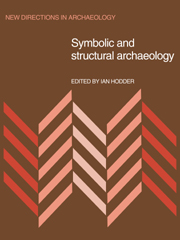Book contents
- Frontmatter
- Contents
- List of contributors
- Preface
- Part one The development of theory
- Part two The search for models
- 5 Matters material and ideal
- 6 House power: Swahili space and symbolic markers
- 7 The interpretation of spatial patterning in settlement residues
- 8 Decoration as ritual symbol: a theoretical proposal and an ethnographic study in southern Sudan
- 9 Structures and strategies: an aspect of the relationship between social hierarchy and cultural change
- 10 Mortuary practices, society and ideology: an ethnoarchaeological study
- Part three Application: the analysis of archaeological materials
- Part four Commentary
- Index
5 - Matters material and ideal
Published online by Cambridge University Press: 27 February 2010
- Frontmatter
- Contents
- List of contributors
- Preface
- Part one The development of theory
- Part two The search for models
- 5 Matters material and ideal
- 6 House power: Swahili space and symbolic markers
- 7 The interpretation of spatial patterning in settlement residues
- 8 Decoration as ritual symbol: a theoretical proposal and an ethnographic study in southern Sudan
- 9 Structures and strategies: an aspect of the relationship between social hierarchy and cultural change
- 10 Mortuary practices, society and ideology: an ethnoarchaeological study
- Part three Application: the analysis of archaeological materials
- Part four Commentary
- Index
Summary
In her introduction, Susan Kus emphasises culture as being meaningfully constituted within historical and intersubjective contexts, and describes the need for a greater dialogue between the social sciences and philosophy. The question of the legitimation of a sociopolitical order in complex societies is seen as concerning the relationship between the social order, a natural order and the individual. It is the ‘naturalisation’ of the social order which is taken up as the focus of the discussion. A distinction is made between legitimating strategies, a distinction between the confounding of the social and natural spheres of activity and representation on the one hand, and the bringing of order different from that inherent in physical nature on the other. Means for the constitution of a legitimating order in spatial relationships are examined in relation to ethnohistorical evidence from the Merina of Madagascar. The spatial layout of the regional settlement pattern and within settlement pattern is shown to play a role in a legitimation of the social order in which the natural and the socially constructed are both involved.
Philosophy is nature in us, the others in us, and we in them. Accordingly, we must not simply say that philosophy is compatible with sociology, but that it is necessary to it as a constant reminder of its tasks, and that each time the sociologist returns to the living sources of his knowledge, to what operates within him as means of understanding the forms of culture most remote from him he practices philosophy spontaneously.
(Merleau-Ponty 1974, p. 107)- Type
- Chapter
- Information
- Symbolic and Structural Archaeology , pp. 47 - 62Publisher: Cambridge University PressPrint publication year: 1982
- 11
- Cited by



